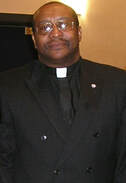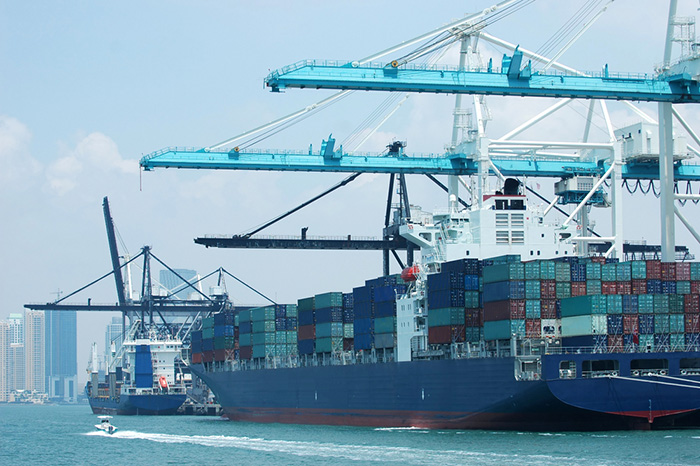
This is part ten of a series on the diaconate we’re calling Diakonia looking at the amazing variety of voices within the ministry of deacons by diaconal candidate Dani Gabriel
In this installment, Dani interviews The Rev. Hal Hurley of Southeast Florida
Previous Series Installments
Part 1: Living with Jesus
Part 2: Interview with Bishop Curry
Part 3: Stephen, the bicycle deacon
Part 4: The Venerable Canon Nina Pickerrell
Part 5: Jess, the Bridge Builder
Part 6: The Rev Tracie Middleton
Part 7: The Rev. Liz Margarita Hernandez Martinez and The Rev. Leticia Guevara-Cuence
Part 8: Janice the Pioneer
Part 9: The Rev. Courtney Jones

Deacon Hal Hurley is a Chaplain to seafarers at the port in Port Everglades, Florida. He has worked as a Chaplain since 2006. He works with seafarers who are struggling with loneliness and isolation, as well as challenging working conditions. Sometimes they are not allowed to leave the ship due to visa restrictions, so Hal goes to them. He visits people from all over the world, bringing hospitality and resources. He is also the deacon at St. Patrick’s church and the Deacon in Charge at St. Cuthbert’s church. Hal is busy, but he was happy to speak with me about his work, which he does with great joy.
Dani: What drew you to the diaconate?
Hal: I’ve always been in the church, but only after I was married and was having our first child did I realize that there was a disconnect between what was going on on Sunday and the rest of my life during the week, so I started investigating more of that and then became more active in the church. As things progressed, I noticed that what I seemed to identify as my calling or those things that I was good at doing were more in terms of helping people, so I started exploring that part of the ministry…
I didn’t feel called to be a priest, although a lot of people thought that I should have gone on to the priesthood, but I don’t think that’s where my strengths and my gifts nor my passion really lies. So it was in that moment in the doctor’s office as I was waiting for my wife to go through her examination that I realized that I was being called to do something different than what I was currently doing in the church. I began the process of investigating the diaconate.
Dani: Why do you we need deacons?
Hal: I think…you go back to the initial call of Stephen, who we recognize as the first deacon. The apostles, they were busy with the word, explaining it to people. It was something new, a new understanding of God, and they needed more time to do expound as opposed to serving the practical needs of the individuals, the individuals who had accepted this new understanding and were within the community. Deacons [were providing] the food, and…all the practical needs of the people who were coming into the community who were unfortunately unable to provide those things for themselves.
Dani: Can you tell me a little bit about your work?
Hal: My first application of this [service] understanding came when I began working at the seaport…visiting the seamen who were coming to the port from various countries, and being alone and in a strange land, so to speak. They were here, they were providing something that we needed, but yet they were detached from us and detached from their natural environment, which was their community back home. I grew into… understanding that expanded service sense and helped them in anyway as they brought those goods that the companies and the country actually needed. This is now going back, 13 years or maybe more, probably more because it was part of my development, and I’ve been ordained now 13 years coming up in December.
Over the years, they’ve had a history of nonpayment for services and for various reasons, so the old seamen’s ministry developed [in part] as working with the owners of these ships to help make sure that the living and working conditions of the workers were just. We had a double ministry in terms of equity of employment and fair wages, or actually wages themselves, because sometimes they weren’t paid, and then providing the pastoral services that they would need being so far away from home.
Dani: What’s the most unique experience you have had in your ministry?
Hal: I guess this sticks out in my mind. The very first day I was on a ship by myself, I had gone through training with being with more senior chaplains, but on the first day I was out there on my own, I boarded this ship, and unbeknownst to me, when it was time, after about an hour, hour and a half, it was time for me to go back to the base, I could not get off the ship because it had moved its position. Now I had to, instead of walking down a plank, the normal gangway plank that we had, I had to climb down what they call the ladder, and I had never done anything like that in my whole life, and here I was dangling off the side of a ship going down a ladder.
Dani: Wow.
Hal: That has stuck with me as probably the most unusual thing that I have done. It was scary, but I made it.
Dani: So what do you love about being a deacon?
Hal: What do I love about being a deacon? There is a sense of satisfaction and fulfillment when you help someone and you could see that they are appreciative of whatever effort you give. Sometimes that’s something practical like doing something for someone, giving them something. Sometimes it’s as simple as just being there for them, not necessarily saying anything or doing anything, but just being there when they needed someone to look at and draw some kind of inspiration or draw some additional strength from, and you could see it in the response.
I say that because I was in the hospital one time, and I got a code blue, I think it is. That means drop everything, go to whatever room it was. The person was dying, and I did that. Unbeknownst to me the individual was, they didn’t recognize me or see me, but the next day, the next day when I visited that individual to see how they were progressing, they told me to leave. But the wife who was there said,” No, he is staying, because yesterday when you didn’t know what was going on, he was here with me,” and that stuck with me in terms of how we do things, and just being the presence there, because all I did with her yesterday was waited for the doctors to do what they had to do.
Of course they threw us out of the room, but we were waiting in the hallway, and I stayed there with her, and I talked with her. We talked about everything in life and nothing specific, nothing spiritual. Yes, I did respond, but I didn’t drive anything into her. I just listened to her story, and we were able to develop a bond, the two of us, and the next day when…he saw me coming into his room, and I was just coming to check on him, he asked me to leave, but the wife stood up and said, “No, he was here when I needed him.”
Dani: What’s challenging about being a deacon?
Hal: Probably getting over the fear that you’re going to be not needed or not wanted, that service issue. The challenge is getting to offer someone something. They don’t always tell you they need something. When you go to the hospital…it’s kind of obvious that they are looking for something or they need something, but the average everyday person doesn’t walk up to you and say, “Hey, I need this. I need that. I can’t do this. I can’t do that.” It’s something you have to help them figure out…That’s the challenge, where and how do you do these things and still maintain the distance that’s necessary so that you don’t get…into everybody’s problems and then be of no use for yourself.
Dani: The church is changing and the world is changing. What are your visions for the diaconate?
Hal: I see it twofold, and I guess I’m going through this at the moment. I see now that there’s a tremendous shortage of priests, the deacon’s role in terms of that pastoral part of the liturgy is going to increase…I see that the deacon’s going to have to step up and play a stronger role or bigger role in the administration of the Sunday service, and then try to maintain what was their primary calling, the service part, providing that service…If you’re not careful, you could suffer burnout and become a hazard, a hazard to yourself, not just the people that you’re working with.
So as the number of priests continue to decline, that’s going to be our biggest challenge…Rising to that occasion and trying to maintain the primary call, which was working with the bishop and responding to the needs of the community in terms of service and providing for them and at the same time helping run the local parish church…We are in uncharted waters in the sense that we have never gone through this in terms of a shortage of priests and how do we make better use of the deacons in the church and at the same time maintain their primary call of service.
Dani: So what do you love about deacons?
Hal: I get a sense of satisfaction from being a deacon…it doesn’t always have to be announced and relayed that Deacon Hurley did this, Deacon Hurley did that the next day and so forth. You just go about your business and do it, and eventually your rewards will come some time as Jesus promised. That’s what I like about it. I can get a sense of satisfaction from going out there and helping someone.
Dani: If someone was discerning a call, what would you say to them?
Hal: Well, what I would say to them is, it’s not most likely going to be a megaphone telling you to do something, but it may be just subtle hints…It’s an interior feeling that you go through and you recognize that, hey, as you sit down and later on at night you recognize it, where did that feeling come from? Then you start to explore these things, of course, in your scriptures, and you get to understand that not everything is a big megaphone that blows the world apart. Sometimes it’s that still, small voice telling you something, and that voice is interior, inside…
You kind of develop and go from there. So I would tell them to pay attention to…this dissonance in what they see and what they feel, and of course what they see and what they feel has to correspond back to scripture. You can’t just get away from that. You can’t get away from scripture, but you would feel and see some kind of dissonance, and you can move from there.
Dani: Thank you.
Hal: Whatever’s needed, I offer my assistance. That’s the way the deacons operate. Whatever they can do, they do, and I think it comes through not only in terms of our, what we would say, ministry, but we were all ministers at one point…we tend to think of ministry only in terms of church-related issues, but ministry is responding to whatever need is out there…We just went through the series in Luke of talking about the good Samaritan. You do what you can for who you can when you can, and you leave it like that.

